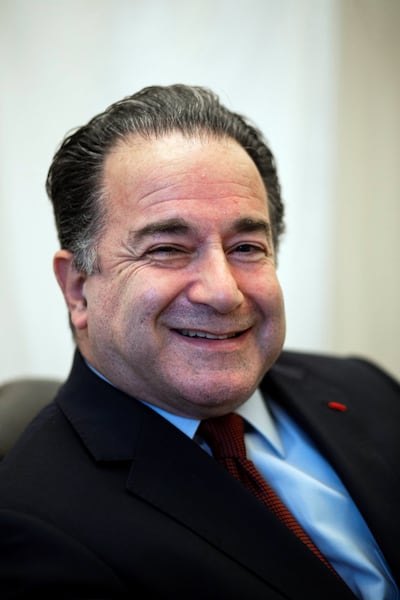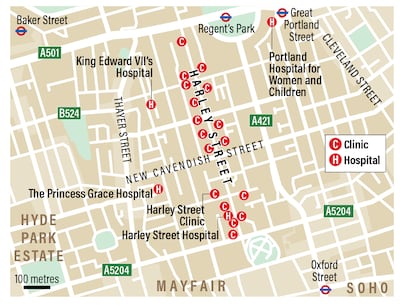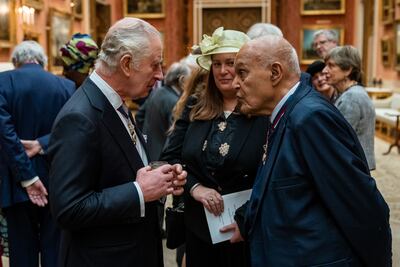The view from the upper floors of the Cleveland Clinic isn’t what you would expect from a hospital in central London.
Looming in a break in a line of trees is the unmistakable sight of Buckingham Palace, the Union Jack fluttering on the day The National visited, signifying the presence of King Charles.
Harley Street surgeon of 25 years Nadey Hakim, the hospital’s international relations director, who is also a professor of surgery, acts as guide to the facility.
The Buckingham Palace location is just a little bit off the beaten track for Prof Hakim, who has combined academic and consulting careers for the majority of his career.
His role is to help promote the hospital and attract patients from the Middle East and elsewhere. He hopes the 200-bed facility can build on the historic links between London’s private health providers and the region.
Among the hum of voices of people relaxing in the airy ground floor atrium, Arabic can be heard. The hospital is hoping to attract many more patients from the region.
Known collectively as Harley Street for the road where many practices and hospitals are located, the term is now used as shorthand for the high-quality health care that comes with a commensurate price tag.
As part of our Global Health series, The National looks at Harley Street's enduring popularity among patients from the Middle East.
The British-Lebanese Prof Hakim, who performed the world’s first hand transplant in France in 1998, explains why it has become such a magnet for patients from the region.
The embassy of the UAE has an office on the street, and Kuwait has one nearby. Down the years they have helped their citizens in seeking treatment, cementing its reputation and popularity.
“Some patients who are very knowledgeable will of course know about Harley Street and come straight but the majority initially came by the health offices opened by the embassies,” Prof Hakim told The National.
“So there’s a large number of patients visiting Harley Street that have been referred through those offices.
“Most doctors are on that street, so if you want an ophthalmologist, a dentist they are on hand. Over the years it has become synonymous with medical care.”
The UK’s location has played a role in attracting patients from the Middle East, many of whom now speak English.

“With France of course there’s translators but it’s not the same,” Prof Hakim said. “Also with Germany, they’re stuck in a place where they don’t speak the language.
“Many patients started going to South Korea but it’s a long way. America is a long way. The care is excellent but it was difficult getting a visa after 9/11, which gave plus points to Harley Street.”
The pleasures of London have also played a role.
“I often joke with my patients ‘so are you going to Harrods tomorrow?’ and they laugh because it’s true,” he said.
Harley Street's quality housing and central location first began attracting doctors in the mid-19th century. By the time the UK's National Health Service was established in 1948, there were 1,500 doctors working there. These days more than 3,000 people work on Harley Street.

In the history of Harley Street and the Middle East, Sir Magdi Yacoub looms large, Prof Hakim said.
Now 87, the Egyptian is a pioneering surgeon who established the UK’s heart transplant centre while working for the NHS.
But when his day was done at Harefield Hospital, he would travel to Harley Street, where he ran a thriving clinic.
His prodigious energy became the stuff of legend and there were stories of him working until 3am, then grabbing a couple of hours of sleep before going back to work in the NHS.
“You have to think why they came at first and the main attraction was cardiac surgery, which patients from the Middle East couldn’t get at home,” Prof Hakim said.
“And the pioneer of heart surgery at the time was Sir Magdi Yacoub.
“Obviously because he was Egyptian, he spoke Arabic, and at that time hardly anyone could speak English. So having a surgeon who could explain to you what surgery you were going to have done in your own language was a big plus.
“I remember his surgeries going until three or four in the morning and there would be a hundred patients waiting for him. For private practice and attracting patients from the Middle East, he undoubtedly was the one.”
When it comes to the standard of care, Prof Hakim says close ties with the NHS and its world-renowned teaching hospital have also played a significant role.
“That doesn’t happen anywhere else in the world,” he said. “For example, when a French surgeon begins his training he can just start in private practice without having to be linked to a public sector hospital.
“In the UK you can’t work in a private hospital unless you are a consultant in the NHS. That means you are a good doctor which is an attraction for many people from the abroad and of course the Middle East.
“If you’ve got that combination, which is quite unusual, it automatically means our doctors are above board.”

For Prof Hakim, who trained in the US and has worked across the world, working as a surgeon in that environment confers “status”.
“Most of the surgeons are really academic and many are professors like myself,” he said. “I’m linked to Imperial College many others are from UCL (University College London) or King’s (College London).
“So they are well selected and we can be proud of this. The hospitals are so well run and equipped so we can be proud of them.
“I personally am convinced one million per cent that the UK will always be an attraction for Middle Eastern patients.”
Harley Street falls within the Howard Walden Estate, which owns the properties where the surgeries and hospitals are based. It has set up the Harley Street Medical Area to market it around the world.
The estate's chief executive Mark Kildea said one of the key links to the Middle East comes from doctors with ties to the UK.
“I've come across many doctors and specialists in the Middle East who have trained in the UK,” he said.
“So they may well have a lot of loyalty to the UK and the training they've received over here differentiates them in the local market. They will also then have connections in the UK and might call someone here to continue a patient's treatment.”
Mr Kildea said Harley Street also uses the Arab Health conference, which takes place at the beginning of the year, to forge links with healthcare providers in the region.
“In Dubai we went to the healthcare zone and they're starting to build some impressive healthcare facilities,” he said. “So why would you choose then to come to London?
“I think there's a preference in that market to get a second opinion or get their treatment if it's a serious case.”

